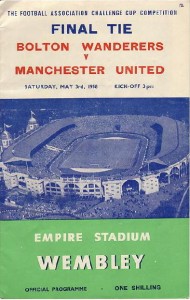2010/11: Nat Lofthouse – True Football Giant

It’s a curious thing that the football greats of the post-war era seemingly get labeled with the sobriquet, “giants”. Leeds United of course had the legendary John Charles who at Juventus, was so revered by the fans that they called him Il Buon Gigante – the gentle giant. This weekend Nat Lofthouse ex-Bolton Wanderers and England passed away, a player the BBC described as, one of the post-war giants of football.
Players such as Tom Finney, Tommy Lawton, Stanley Matthews, Billy Wright, Wilf Mannion, and Stan Mortensen, all finished playing before I was watching football, but I know their names and recognise their place in the football history of this country. Their playing days, like John Charles and Nat Lofthouse belong to a game, era and society that are very different to that now.
Unlike many of the players today, Nat Lofthouse was a one-club man, making more than 450 appearances for Bolton Wanderers, earning 33 caps for England. Lofthouse was Bolton born and bred and was signed as a 14-year-old schoolboy by Charles Foweraker (Bolton manager from 1919-1944). Lofthouse played during the Second World War and also worked as a Bevin Boy coal miner, and eventually turned professional in 1946. The money players received back then will be seen as comical by today’s standards. £10 was the fee Lofthouse received when he signed-on, but he reflected, ”…I know £10 doesn’t seem much these days, but it was four times more than my Dad was getting per week as a coal bagger for the Co-Op…”. It’s an interesting point, as it illustrates that even back then payments in football out-stripped that of the ordinary working man. Lofthouse made his debut in a wartime 5–1 win against Bury on 22 March 1941 and scored two goals. However, it was then more than five years until he made his League debut for the Trotters against Chelsea on 31 August 1946, when he scored twice in a 4–3 defeat. Lofthouse retired in 1960 having scored 255 goals for the club.
During his club career, Lofthouse played in two FA Cup Finals, both of which have gone down in the annals of Wembley Stadium, but with different outcomes for the Bolton player. He scored a goal, but was on the losing side, in the famous 1953 FA Cup Final which became known as, The Matthews Final having previously scored in each round. That was the only blemish on a season when Lofthouse topped the First Division scoring charts with 30 goals and won Footballer of the Year. Five years later, Lofthouse captained Bolton against Manchester United. Wanderers won the game 2–0 with Lofthouse scoring both goals. However, the second was highly controversial and remains a talking point to this day. Lofthouse went into a challenge with the United keeper Harry Gregg knocking him unconscious as he barged Gregg into the net to score. Looking at the footage in this era, it seems inconceivable that shoulder charging was a legitimate part of the game, especially since nowadays goalkeepers are offered more protection than most endangered species.
As an international Lofthouse had a brilliant scoring record, with 30 goals from his 33 appearances. His England debut was on 22 November 1950 and he scored both goals in a 2–2 draw against Yugoslavia in the game at Highbury. Perhaps his most famous international game came on 25 May 1952. The England forward earned the title Lion of Vienna after scoring his second goal in England’s 3–2 victory over Austria. In the act of scoring and running from the half-way line, he was elbowed in the face, tackled from behind and finally brought down by the goalkeeper. He played in the 1954 World Cup in Switzerland scoring three goals. Lofthouse made his final England appearance, against Wales, at the age of 33 on 26 November 1958. During the eight years of his international career, England played approximately 70 fixtures. In the eight years between 2002 and 2010, England played nearly double this amount of games. That says all sorts about the modern era which has seen an increased number of games in Qualification for World Cups and that World Cup tournaments in terms of team participation has increased, allied with the introduction of the European Championships and the increase in friendlies. However, it is interesting to consider how many goals Lofthouse may have scored if he had the number of games available to the modern day international.
After retiring, Lofthouse continued his links with his home-town club. He became the assistant trainer at Burnden Park in 1961 and was then appointed chief coach at the club in 1967. Between 1968 – 1970, Lofthouse spent a brief time as caretaker manager of the club before taking the job full-time. After the brief management stint he became Bolton’s chief scout and later administrative manager. In 1978, he became the club’s executive manager and became president in 1986. Nat Lofthouse’s connection with the club in so many capacities over 50 years is an incredible feat. One that would be seemingly impossible to replicate in the modern era.
In closing, I’d like to let the words of the Bolton great speak for themselves, “…the game’s changed out of all recognition to my day…the strips changed, the ball’s changed and the money has changed…but I still believe footballers take great pride in the game. I don’t know about me but people like Matthews and Finney would be seen as very good players, I’ve no doubt about that…”
Spoken like a true football giant.